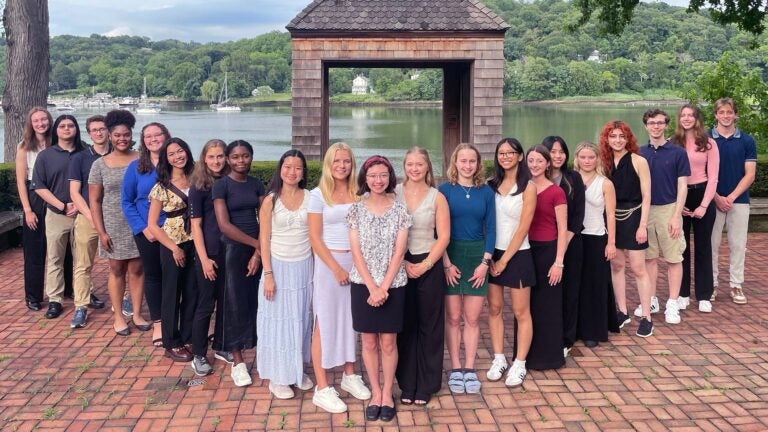Undergraduate Research Program
The Undergraduate Research Program (URP) at CSHL provides an opportunity for undergraduate scientists from around the world to conduct first-rate research. Students learn the scientific process, technical methods and theoretical principles, and communicate their discoveries to other scientists. Approximately 20 students come to CSHL each summer for the program, living and working in the exciting Laboratory environment.
URP participants work on an ongoing research project in one of CSHL’s expert labs. Research at CSHL focuses on:
- Molecular Biology & Cancer
- Genetics & Genomics
- Neuroscience
- Plant Biology
- Quantitative Biology
In addition to doing research in the lab, URP participants attend a series of specially designed workshops, seminars and collegial events. Workshops focus on learning particular skills, such as Python programming, while seminars cover research topics, responsible conduct of research, and career development. At the URP Symposium at the end of each summer, students present their research to the entire CSHL community.
URP participants live and work among CSHL scientists. They are invited to all Laboratory social activities, including an exclusive dinner with CSHL President Bruce Stillman. On weekends, students are free to explore nearby New York City or the sandy beaches of Long Island.
By the end of the summer, URP participants have first-hand experience of a career in scientific research.
The 2025 URP Program will be held Monday, June 9 – Saturday, August 9, 2025.
2025 Applications are now closed
2026 Applications will open in September 2025.
Scientific Research
All URP students undertake an original research project, mentored by one of CSHL’s outstanding research faculty. Students have access to the Lab’s state-of-the-art research facilities, including extensive resources for genomics and microscopy. At the end of the Program, students write a scientific manuscript about their summer work. Some of these become part of peer-reviewed scientific publications.
Bioinformatics and Computational Neuroscience Workshop
CSHL’s URP presents students with a two-part workshop in Bioinformatics and Computational Neuroscience.
Hands-on programming workshops
These workshops (1 per week) train students to analyze and visualize biological data in Python.
Lecture series
The lecture series consists of sessions focused on important topics in bioinformatics and computational neuroscience. Sessions include:
- Applications of computational analyses in biology
- Crop improvement through bioinformatics
- Modeling framework for interpreting deep neural networks in functional genomics
Training in Scientific Communication
The Program offers lectures on how to give a scientific talk. In the course of the summer Program, students prepare a research abstract and a scientific report, and present two research talks for the entire CSHL scientific community.
Career Development
URP participants attend a series of lectures and panel discussions aimed at informing them about the process of pursuing a research career or a variety of non-research scientific careers. Sessions include:
- Faculty perspectives on research careers
- Graduate school and fellowship applications
- Non-research career panel
Responsible Conduct of Research
Before starting work in their laboratories, URP participants attend a Responsible Conduct of Research workshop, which covers ethical issues in biological research. Students are also instructed in laboratory safety.
Current sophomores and juniors are eligible. Applications must be submitted online by January 15.
Online Application
- All applicants must complete an URP application form with a personal statement online.
- Faxed, mailed, or emailed applications are not accepted.
- You may submit your application before the recommendation letters have been uploaded by your referees.
- Once an application has been submitted, changes cannot be made. Please review your application carefully before submitting.
- To use the online application system, you must first register as a user. On the main login page, there is a link that says “New User? Register Here” to the right of the “Go” button. If you do not see this option, make sure your internet browser is up-to-date and/or try a different browser (Chrome, Firefox, Safari). If you continue to experience problems, please contact Embark, the application manager at help@embark.com
Personal Statement
- Your personal statement is limited to a single page – approximately 600 words or 3,250 characters (including spaces), single-spaced. You should use a minimum of 1-inch margins.
- You should ensure that your statement is legible. We would appreciate a minimum of 11-point font, preferably sans serif (such as Helvetica). Other traditional fonts, such as Times New Roman, are also acceptable.
- Please give a brief description of why you wish to participate in the Cold Spring Harbor Laboratory Undergraduate Research Program. This should include: (i) your career interests, (ii) how the URP can help you achieve your goals, (iii) details of any pertinent research experience, employment, extracurricular activities, and (iv) any other information you believe to be relevant to your application. You may also list 2-3 research mentors you would like to work with in your personal statement.
Dates and Deadlines
- The deadline for receipt of completed applications, including letters of recommendation, is January 15 at 11:59 pm (23:59) Pacific Standard Time (equivalent to January 16, 07:59 UTC/GMT). Applications will not be reviewed if they are received after the deadline.
- Recommendation letters will not be accepted after the application deadline. Please make sure your referees are aware of the January 15 deadline when you ask them to write a recommendation. Most referees need at least a month to complete a letter. If your referee has any problems uploading the letter to the online application system, they should contact help@embark.com directly.
- Notification of application status will be sent by the end of March.
Eligibility
- Students of any nationality are eligible for the program.
- Students should have a strong academic background in a science. Although the Program emphasizes the biological sciences, students with engineering, chemistry, computer science, math, or physics backgrounds are also encouraged to apply.
- Students must be returning to an undergraduate degree program following their URP summer research experience; current sophomores and juniors, or the equivalent, are eligible. Only in exceptional cases will first-year undergraduate students, with prior independent research experience, be considered.
- Previous laboratory research experience will help your application but is not required.
- If your academic semester conflicts with the dates of the URP program, you are still eligible to apply. If you are accepted into the Program, we will discuss how your academic schedule can be accommodated. For instance, in past years, some students have arranged with their professors at their home university to take one or more final exam at CSHL. But please note that all URP researchers are expected to participate in the program as a single group and must therefore plan to be at CSHL during the dates of the program.
Grades & Transcripts
- Official transcripts are not required.
- There is no minimum GPA required. Successful applicants generally have GPAs around 3.5 or higher in their science and math courses.
- If your GPA is not on a 4.0 scale, then please convert your grade to a 4.0 scale. If your institution does not have a standard scaling, then calculate by dividing your average mark by the maximum possible mark and multiplying by 4.0.
International Applicants
- Students of any nationality are eligible for the program.
- TOEFL or IELTS scores are not required for admission to the URP program.
- If your grades are not based on a 4.0 scale, please note your institution’s grading scale and the actual class mark you received on the application. Also indicate the best possible mark. For example, if your university scale is 1 to 5, then note your grade as X/5, 1=best.
Recommendation Letters
- Applicants must arrange for two recommendation letters from professors – preferably in math or science – to be submitted online. We do not accept more than two recommendation letters.
- If you have previous research experience, recommendation letters from professors with whom you have worked in a lab are especially encouraged. Letters from graduate students or postdocs in the lab are less effective.
- Faxed, mailed, or emailed recommendation letters are not accepted.
- Your referees will upload their recommendation letters directly to the online application system manager. When you fill in the application, you will submit the email addresses of your referees. Your referees will receive an email with instructions on how to upload their recommendation letter online. Please tell your referee that they will receive an email from the Embark application system so this notification email does not end up in spam.
- You may submit your application before recommendation letters have been uploaded by your referees.
- Recommendation letters will not be accepted after the application deadline. Please make sure your referees are aware of the January 15 deadline when you ask them to write a recommendation. Most referees need at least a month to complete a letter. If your referee has any problems uploading the letter to the online application system, they should contact help@embark.com directly.
Stipend
Students receive a stipend of $6,000. Room and board expenses will be partially covered.
Housing Environment
URP participants reside in the cabins on the Cold Spring Harbor Laboratory campus. Each cabin provides housing for 8 individuals, with two single-gender students per room. Also, each room has a full bathroom. All linens, blankets, pillows, and towels are provided, along with full housekeeping services. Two arm chairs and a small table are available in each cabin, and one telephone is available in the common area. The cabins are also equipped with Wi-Fi internet access. All cabins are fully air-conditioned.
Meals are served three times a day, seven days a week in the Blackford Dining Hall. Vegetarian and Vegan options are available at all times and our kitchen will make every effort to accommodate any special needs.
Gym equipment and weights are available in the exercise room located in the lower level of the Dolan Hall. Also, washer and dryer facilities are available in Dolan.
The Laboratory owns canoes and kayaks, available for URP student use. All participants are free to use our tennis and volleyball courts, running and hiking trails, swimming pool and private beach.
CSHL holds volleyball tournaments during the summer where different laboratory buildings square off against each other. URP students are invited to join these teams, compete against the graduate students throughout the summer and the faculty at annual URP vs. PI (Principal Investigator/Lab Head) tournament, held at the end of the summer.
What past URP participant(s) said about their summer at CSHL.
Amalia Jardiniano, Stillman Laboratory
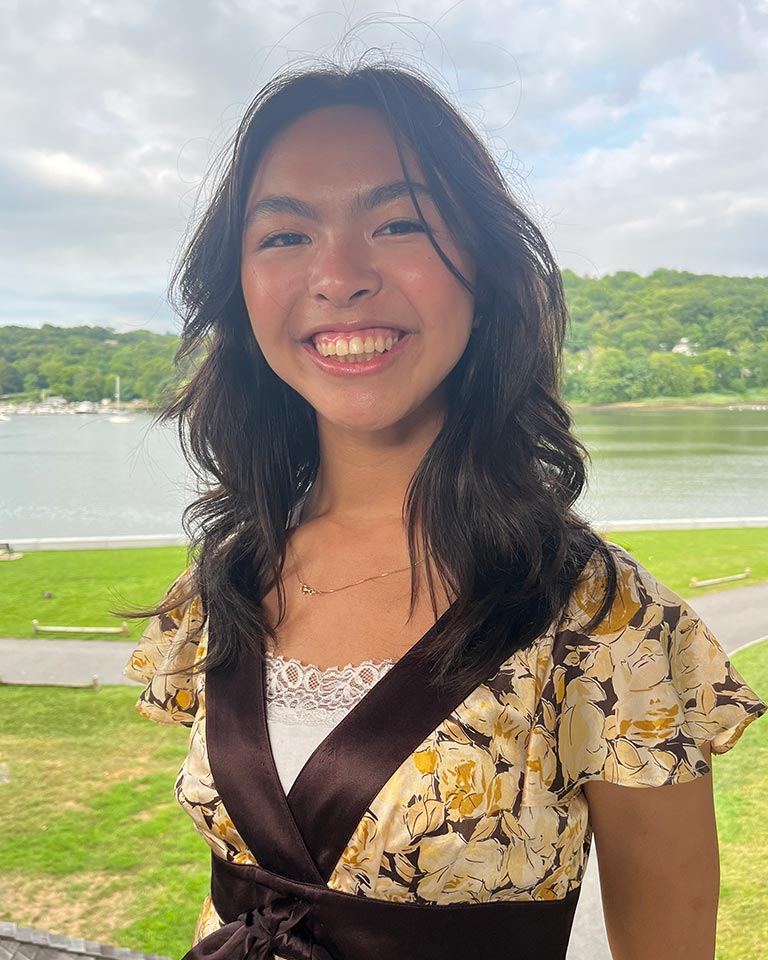
Can you believe that there’s even more to love? During your URP summer, you will be surrounded by a cohort of other young scientists that go through the same ups and downs as you and will be peers you can lean on. The science community is smaller than you may think. Although we are all undergraduate students this summer, in due time, maybe we will all be principal investigators looking to collaborate with one another. Until then, I will happily go on more city trips, play more volleyball, watch more movies, frolic more in Huntington Village, and, of course, eat more family dinners at Blackford. This has become an ode to my fellow 2024 URPies, but it is all to say that my time at CSHL as an URP has been unforgettable, and I will cherish it forever.
Catherine Rasgaitis, Hou Laboratory
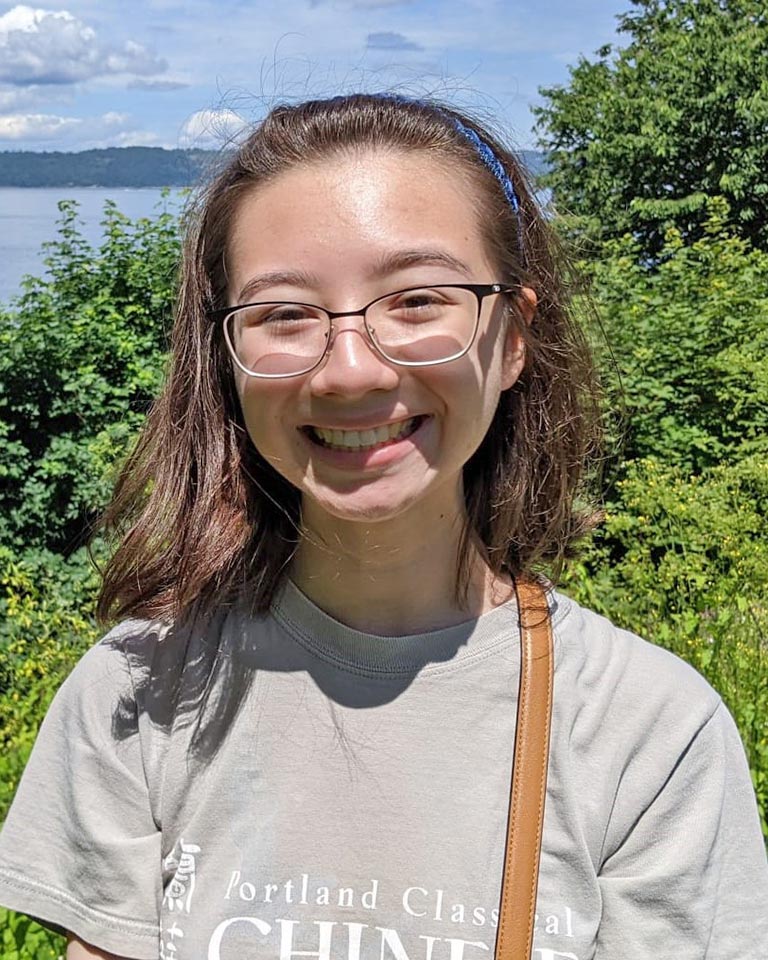
Beyond the exciting research, the work-life balance at CSHL was exceptional, with ample opportunities to connect with my fellow URP students and enjoy the beautiful campus surroundings. I went to the beach almost every other day to go swimming, kayaking, or paddle boarding (highly recommend!). I also loved playing volleyball in the evenings and taking the train to explore New York City on the weekends.
As the program comes to an end, I know I’ll deeply miss my lab mates and fellow URP students, but the friendships and memories I’ve made will stay with me forever. I’m incredibly proud of everything we’ve achieved in these nine weeks, and I can’t wait to see where life takes us as CSHL URP alumni.
Julianna Rose, Jackson Laboratory
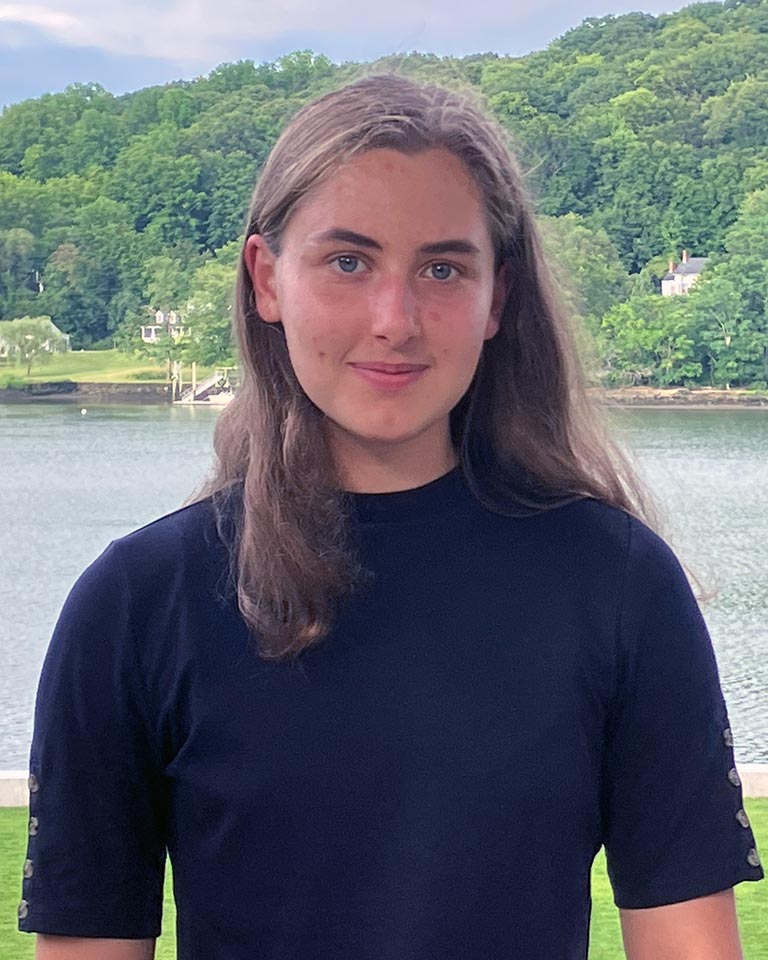
With my project, I was able to spend time both in the lab and at Uplands Farm, seeing the interplay between field work and lab work. This application was incredibly helpful to see, as I had always thought I had to choose one or the other, but this project allowed me to broaden my horizons as a plant science student. I loved how applicable my project was, as my research was highly aligned with my interest in plant adaptations to climate change related stressors. Additionally, I was lucky enough to be in the lab at the same time as the plant biology course—my PI encouraged me to attend the lectures when I had time. This was a wonderful opportunity to hear presentations from experts in the field, and I was glad to be able to take advantage of this unique opportunity at CSHL. (There are many other courses hosted at the lab over the summer apart from the plant course, and many of the URPs were able to take advantage of this, which was amazing.)
The experience of giving a scientific talk to the CSH community was also a valuable, albeit nerve-wracking, part of this experience. I feel that my skills in putting together a scientific presentation were greatly improved and I was able to learn from my fellow URPs when they presented their preliminary talks and results, which I loved. Overall, the URP program was a wonderful experience that allowed me to grow as a researcher and a learner and I would highly recommend this program.
Nicholas Schiller, Westcott Laboratory
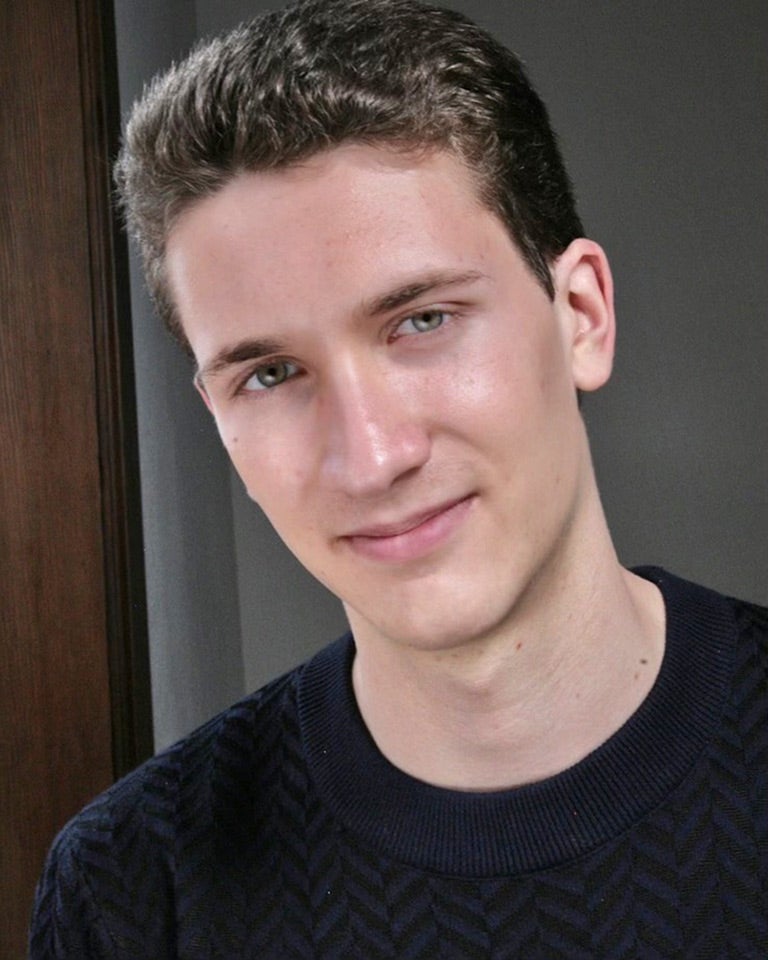
Program at CSHL. I was fortunate to have the chance to study the early progression of colon cancer in Dr. Peter Westcott’s Lab. Peter regularly met with me to help me understand my project and guide my progress. He assigned me two mentors, Yihan Qin and Alex Cicala, who taught me cell culture techniques and helped me contribute to the lab’s research. I’m very thankful for the time and attention my mentors gave me. With their help, I feel I made a small but meaningful impact to the lab’s progress in the fight against colon cancer.
In addition to research, URP provides excellent opportunities to grow as a scientist. I attended weekly talks where CSHL scientists presented fascinating research. I learned about grad school and careers in science from the fantastic Grad School Team. I even got to practice giving talks, which was a critical part of my experience. Preparing my talks significantly improved my understanding of my research.
But maybe the best part of URP is the friendly, summer camp style environment. My fellow URPies and I lived in cabins together, got regular meals, and played lots of volleyball. I made a lot of nice memories, and I hope to stay close with my fellow URPies! URP gave us a wonderful summer experience.
Deasia Valdemar, Pouchelon Laboratory
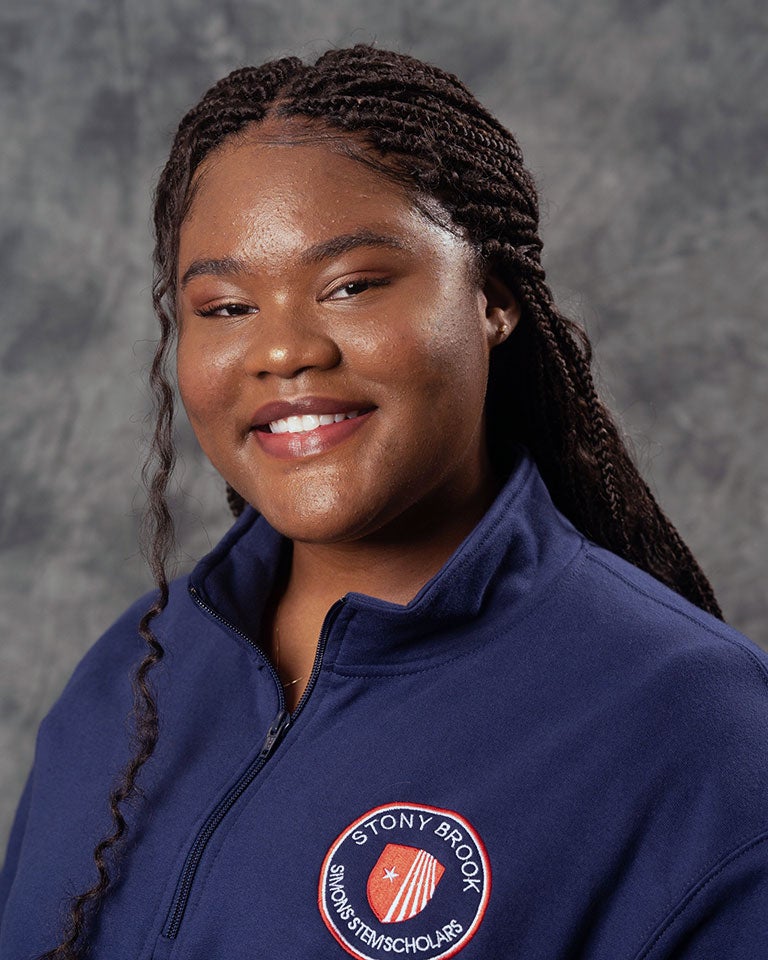
Miriam Van de Water, Banaerjee Laborarory
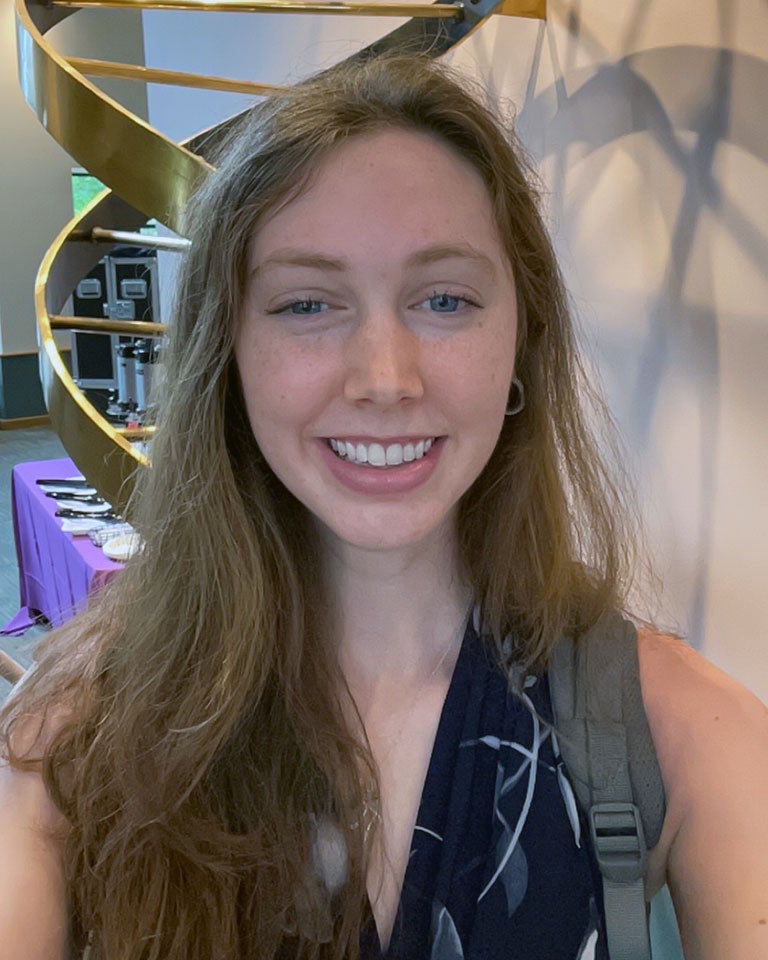
If I could convey my summer at CSHL as a mathematical equation it would look something like this: URP = high caliber research + summer camp. It is truly an experience like no other. You are steeped in science everywhere from the lab to the lunch line to the sculptures that dot the campus. Yet, there are endless opportunities to have fun when you need a break—my volleyball skills improved almost as much as my coding knowledge! I am so blessed to have been granted this summer of intense learning, scientific discovery, and personal growth.
Jordan Walter, Albeanu Laborarory
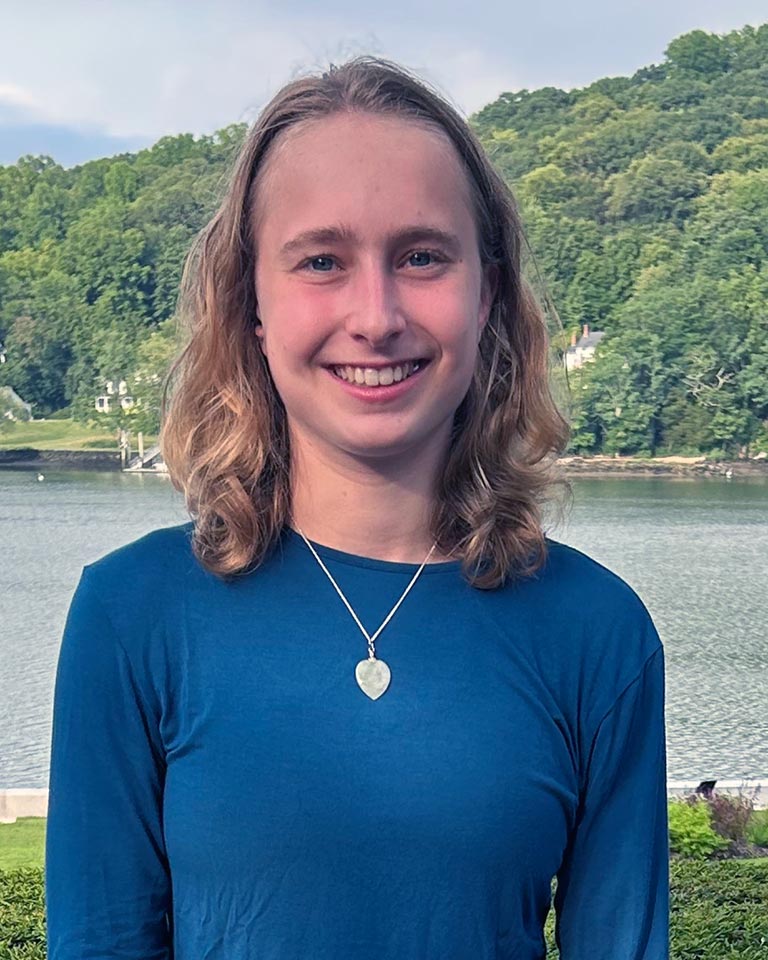
I came into my summer at Cold Spring without much background in large-data computational neuroscience. This summer presented me with a very steep learning curve, but I felt supported in my work by lab members and through all of the resources the program provided me outside the lab. We had a coding course where we learned about different quantitative analytical techniques, and various guest lecturers throughout the summer that exposed us to new areas of research. In the lab, I worked with single cell datasets, sub-clustering and categorizing them to determine neural subtype identity in the olfactory bulb of mice. We hope that this research will elucidate neural connectivity patterns to higher cortical areas of the olfactory bulb and answer questions regarding the presence of an inherent structure in the olfactory system.
Since 1959, the URP Program has been offering undergraduate students a unique opportunity to study with CSHL’s renowned scientists. Some of our notable alumni include Nobel laureate Dr. David Baltimore (California Institute of Technology), Dr. Gerry Rubin (HHMI, Janelia Farm Research Campus), Dr. Alfred Goldberg (Harvard Medical School), Dr. Geraldine Seydoux (Johns Hopkins), and Dr. Charles Gilbert (Rockefeller University), among many others.
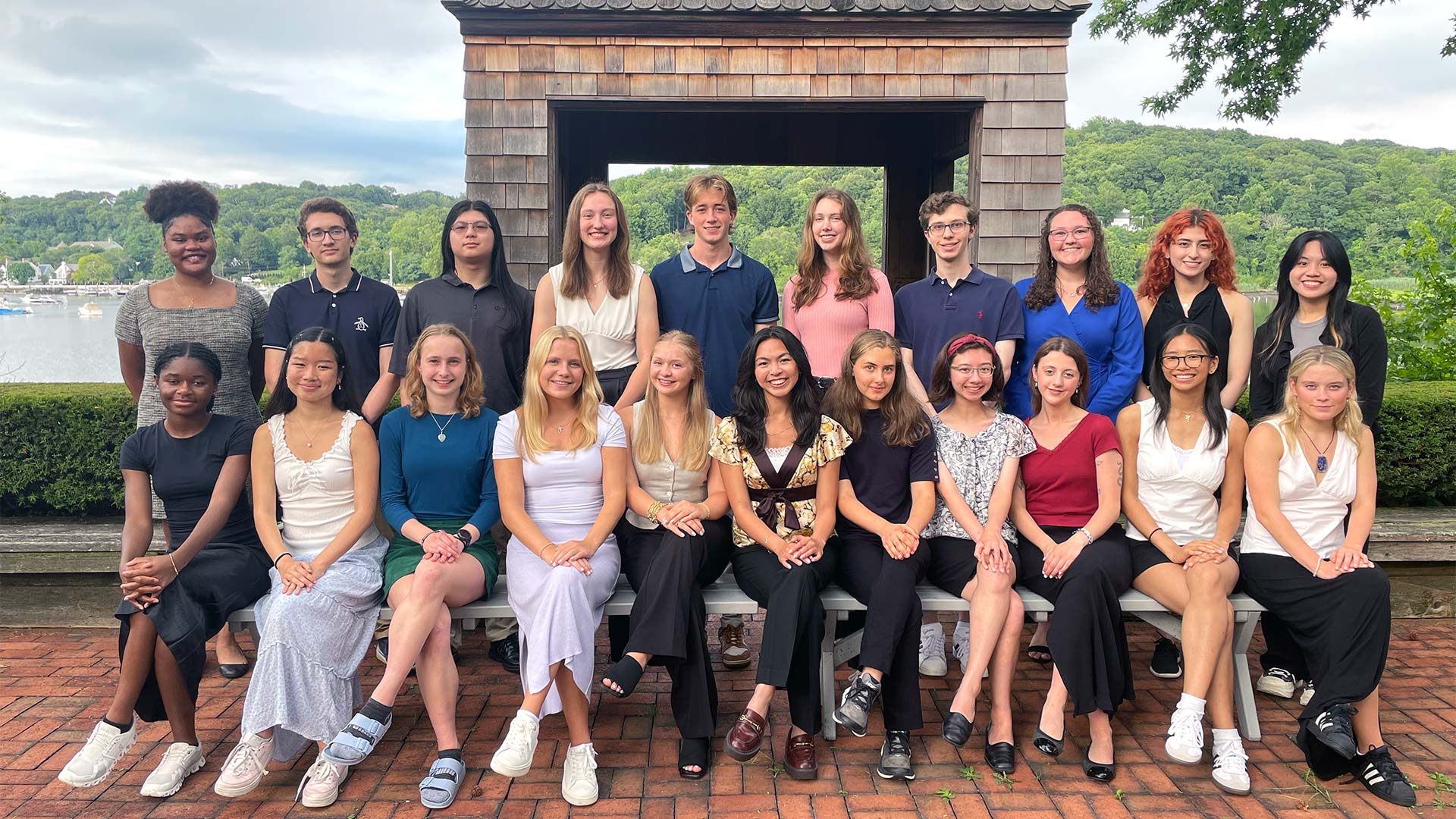
Previous alumni by year
2024 | 2023 | 2022 | 2021 | 2019 | 2018 | 2017 | 2016 | 2015 | 2014 | 2013 | 2012 | 2011 | 2010 | 2009 | 2008 | 2007 | 2006 | 2005 | 2004 | 2003 | 2002 | 2001 | 2000
All URP Alumni PDF icon
Make a donation to Cold Spring Harbor Laboratory’s Undergraduate Research Program.
NSF Sponsored REU in Bioinformatics and Computational Neuroscience
CSHL’s REU program in Bioinformatics and Computational Neuroscience was supported by the NSF 2005 – 2014 and 2016 – present.
The technological advances in this century open a new realm of biological questions that can be addressed experimentally. Large genomic sequence or image datasets are routinely and quickly acquired, but the resources and expertise to analyze this data present a challenge to researchers. CSHL’s unique NSF REU program in Bioinformatics and Computational Neuroscience addresses this need by providing early training to undergraduate students who might not otherwise pursue quantitative approaches. CSHL’s URP/REU students learn theory and techniques from an applied perspective, investigating an important biological problem rather than from the abstract perspective of computer science. Students are mentored by expert CSHL researchers, who combine biology, information theory and sophisticated computational techniques to address questions at the frontiers of modern genomics, bioinformatics, and neuroscience. In the past ten years, CSHL’s URP/REU program has recruited and trained a diverse group of students, many of whom are still working in bioinformatics or computational fields. Almost all URP/REU participants have continued in scientific careers and/or advanced degree programs at competitive institutions. The program provides students with a modern quantitative biology training program that aims to inspire young scientists to become active participants in modern biological research with its demands for quantitative and computational skills.
Prospective REU Project Mentors
- Dinu F. Albeanu – Neuronal circuits; sensory coding and synaptic plasticity; neuronal correlates of behavior; olfactory processing
- Arkarup Banerjee – Vocal communication, singing mice, systems neuroscience, neural circuits, neuroethology
- Jeremy Borniger – Sleep, neuromodulators, cancer neuroscience, homeostasis, host-tumor physiology
- Lucas Cheadle – Synapse, refinement, pruning, sensory experience, microglia, development, autism, 2-photon imaging, single-cell RNA-sequencing, cytokine
- Benjamin Cowley – computational neuroscience; closed-loop experiments; interpretable models; deep neural network models; machine learning
- Alexander Dobin – Computational genomics; transcriptomics; epigenomics; gene regulation; big data; precision medicine
- Hiro Furukawa – Membrane proteins; x-ray crystallography; electrophysiology
- Thomas Gingeras – Genome-wide organization of transcription and the functional roles of non-protein coding RNAs
- Helen Hou – neural circuits; natural behaviors; brain-body interaction; electrophysiology; movement control; neural computation
- Ivan Iossifov – Computational biology; molecular networks; human genetics; human disease; applied statistical and machine learning; biomedical text-mining; molecular evolution
- David Jackson – Plant development; stem cell signaling; genomics and imaging
- Leemor Joshua-Tor– Structural biology; nucleic acid regulation; RNAi
- Justin Kinney – Sequence-function relationships; biophysics; deep sequencing; machine learning; transcriptional regulation; DNA replication
- Peter Koo – Sequence-function relationships, deep learning, representation learning
- Alexei Koulakov – Theoretical neurobiology; quantitative principles of cortical design; computer science; applied mathematics
- Alexander Krasnitz – Genomics of cancer; machine learning for biology; inference from noisy biological data; large-scale numerical computing.
- Zachary Lippman – Plant development, genetics; molecular mechanisms of phase transitions for flowering time and inflorescence branching; heterosis
- Rob Martienssen – Epigenetics; DNA methylation; chromatin and chromosome biology; transposable elements; RNA interference; stem cells; germline specification; plant genomics; plant evolution; aquatic plants
- David McCandlish – Computational biology; sequence-function relationships; population genetics; protein evolution; machine learning
- W. Richard McCombie – Genomics of psychiatric disorders; genomics of cancer; computational genomics; plant genomics
- Hannah Meyer – spatial transcriptomics; immunology; central tolerance; bioinformatics
- Partha P. Mitra – Neuroinformatics; theoretical engineering; animal communications; neural prostheses; brain mapping; developmental linguistics
- Saket Navlakha – Algorithms in nature, biological computation, neural circuits, plant architectures
- Ullas Pedmale – Plant growth; signaling; genomics; development; plant-environment interactions
- Gabrielle Pouchelon – neural circuits; development; gene regulation; synaptic refinement; plasticity; neurodevelopmental disorders
- Stephen Shea – Olfaction, audition, communication behaviors, in vivo electrophysiology, individual recognition
- Adam Siepel – Biological statistics; population genomics; evolution; transcriptional regulation
- David L. Spector – Cell biology; gene expression; nuclear structure; microscopy
- Jessica Tollkuhn – Transcriptional regulation, chromatin, critical periods in neurodevelopment, steroid hormones and behavior
- Doreen Ware – Computational biology; comparative genomics; genome evolution; diversity; gene regulation; plant biology
- Michael Wigler – Human genetic disorders; population genetics; cancer genomics
- Anthony Zador – Cortical mechanisms of auditory attention; neural computation; connectomics
Eligibility
All URP participants may take part in the Bioinformatics and Computational Neuroscience program. NSF-supported REU participants are selected from among the URP participants. Students supported by NSF must be citizens or permanent residents of the United States or its possessions. If you are interested in bioinformatics and computational neuroscience, including research in any of the labs listed above, but are not a US citizen or permanent resident, you are eligible for the program through sponsorship from non-restricted URP fellowships.
As for all URP participants, NSF-supported students must be currently enrolled as undergraduates. An undergraduate student is a student who is enrolled in a degree program (part-time or full-time) leading to a baccalaureate or associate degree. Students who will have graduated before the program starts in June are not eligible.
Participants must be “returning to an undergraduate program” after the summer REU program. (See NSF eligibility requirements).
